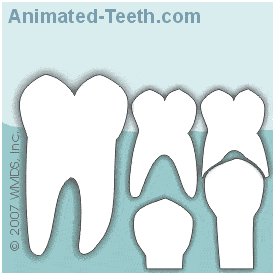Why Baby Teeth Matter

“Why are baby teeth important? They fall out anyway, right?” This is a common sentiment expressed by many families attending the dental clinic with their little ones. The truth is that baby teeth DO matter! Baby teeth or milk teeth are important to your child’s health and development, and they should be taken care of just as well as permanent teeth or adult teeth. Here is why.
Toddlers and children need baby teeth to bite and chew so that they can enjoy a variety of different foods and maintain a healthy diet. Baby teeth also help with speech and help grow the jaws and face.

Baby teeth hold the space for the adult teeth and guide them into their correct position. When the timing is right and the adult tooth begins to erupt, it breaks down the roots of the overlying baby tooth. The baby tooth becomes wobbly and falls out. The adult tooth then takes its position in the mouth.
Cavities (holes) can develop in baby teeth too. Regular consumption of sugary snacks and drinks, and poor brushing habits can make cavities more likely. If cavities are not treated they can progress and kill the nerves and blood vessels inside the tooth pulp. This may cause severe tooth ache and infection.
Children who experience dental pain may lose sleep, have difficulty focusing and paying attention at school, and may have to miss school altogether. Dental pain can also affect your child’s physical growth and development as children with sore teeth may skip meals or eat less.

Unresolved infection can also affect the underlying and still forming adult tooth. To avoid this, the paediatric dentist may recommend root canal treatment or the removal of the baby tooth depending on the severity of the infection and stage of development of the underlying adult tooth.
Early loss of baby teeth due to dental decay can cause nearby teeth to drift or tip into the space. This leaves less room for the permanent tooth which can be blocked from erupting into that space and result in dental crowding. In such cases, your child is more likely to need braces.
To avoid this, the paediatric dentist may recommend the use of space maintainers just after the extraction to maintain the space until the adult tooth is ready to erupt into the mouth.
Signs your child may have dental problems

- complain of a sharp pain or a dull ache when eating hot, cold, sweet or hard foods
- complain about food getting stuck in their teeth
- have difficulty sleeping at night due to the pain
- keep putting their fingers or toys in their mouth
- don’t allow you to brush their teeth
- lose their appetite
- be more irritable or grumpy than usual
- too tired to focus and participate at school
If you suspect your child has a dental problem, do not hesitate to book a dental check up.
The good news is that once your child’s dental issues have been diagnosed (usually after visually examining the teeth and taking low-dose dental x-rays), most if not all problems can be fixed and managed.
References
- Pine CM et al. An investigation of the relationship between untreated decayed teeth and dental sepsis in 5-year-old children. Br Dent J. 2006 Jan 14;200(1):45-7; 29. doi: 10.1038/sj.bdj.4813124.
- Gilchrist F et al. The impact of dental caries on children and young people: what they have to say? Int J Paediatr Dent. 2015 Sep;25(5):327-38. doi: 10.1111/ipd.12186
- Casamassimo PS et al. Beyond the dmft: the human and economic cost of early childhood caries. J Am Dent Assoc. 2009 Jun;140(6):650-7. doi: 10.14219/jada.archive.2009.0250.
- Ruff RR et al. Oral health, academic performance, and school absenteeism in children and adolescents: A systematic review and meta-analysis. J Am Dent Assoc. 2019 Feb;150(2):111-121.e4. doi: 10.1016/j.adaj.2018.09.023.

